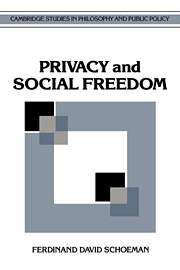Book contents
- Frontmatter
- Contents
- Acknowledgments
- Introduction
- 1 The meaning and scope of privacy
- 2 Mill's approach to social freedom
- 3 Articulated rationality and the Archimedean critique of culture
- 4 Social freedom from the perspective of cognitive and social psychology
- 5 The importance of cultural authority for morality
- 6 Explaining privacy's place
- 7 The ascent of privacy: a historical and conceptual account
- 8 Privacy and gossip
- 9 Privacy and spheres of life
- 10 Spheres of life: a literary exploration
- Epilogue
- Notes
- Index
6 - Explaining privacy's place
Published online by Cambridge University Press: 23 October 2009
- Frontmatter
- Contents
- Acknowledgments
- Introduction
- 1 The meaning and scope of privacy
- 2 Mill's approach to social freedom
- 3 Articulated rationality and the Archimedean critique of culture
- 4 Social freedom from the perspective of cognitive and social psychology
- 5 The importance of cultural authority for morality
- 6 Explaining privacy's place
- 7 The ascent of privacy: a historical and conceptual account
- 8 Privacy and gossip
- 9 Privacy and spheres of life
- 10 Spheres of life: a literary exploration
- Epilogue
- Notes
- Index
Summary
In this chapter, I explain privacy's role in sustaining social freedom. To prepare for that explanation, I first discuss the importance of social control for societies and associations of various sorts and sizes. I then develop an account of social freedom, and end with a discussion of privacy's role in counterbalancing social control mechanisms.
As argued in the past several chapters, there is ample reason to change our conception of moral rationality. The principle of articulated rationality is not well suited to reveal the nature of moral understanding or moral being. The principle's contempt of culture and of our susceptibility to socializing pressures and influences makes it an inappropriate standard for human practices. We are not rational beings in the senses that moral theories often stress: We are not rational in the sense of being primarily or exclusively motivated to further our self-interest independent of all else. We see ourselves as social beings whose stake lies in life with others. We are not rational in the sense that how others do things, how our culture does things, is irrelevant to legitimization. Customary practices are a legitimizing ground. We are not rational in the sense that we should be confident that our own judgment, when not supported by others, is a valid basis for action or judgment. We are not rational in the sense that we need no more motivation for judging or acting than is provided by having an abstract belief that something is right or wrong.
- Type
- Chapter
- Information
- Privacy and Social Freedom , pp. 89 - 114Publisher: Cambridge University PressPrint publication year: 1992



